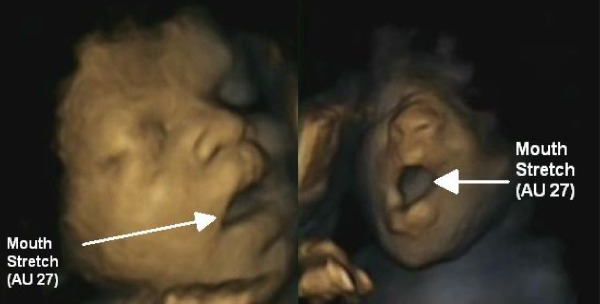
Get the world’s most fascinating discoveries delivered straight to your inbox.
You are now subscribed
Your newsletter sign-up was successful
Want to add more newsletters?
Join the club
Get full access to premium articles, exclusive features and a growing list of member rewards.
Even fetuses yawn, a new study shows.
During the second and third trimester, fetuses yawn frequently, and those yawns can be distinguished in four-dimensional ultrasounds from other mouth-opening behaviors. As the fetuses mature, they seem to yawn less frequently, the researchers added.
The findings, published Nov. 21 in the journal PLoS One, suggest yawning patterns of the fetus across pregnancy could be used to assess whether a growing fetus is developing normally.
Scientists don't know why adults, let alone babies, yawn, said study co-author Nadja Reissland, a developmental psychologist at Durham University in the United Kingdom. But yawning behavior changes throughout life. [See Images of Yawning in the Womb]
Yawns in adults are contagious, but babies don't catch them. Anemic babies yawn more in utero than healthy ones, according to a 1999 study detailed in the journal Ultrasound Obstetrics and Gynecology. And premature babies yawn more than full-term babies. (Previous research has shown that as fetuses develop, their facial expressions in the womb become more complex.)
That led Reissland to wonder whether yawning patterns could be an early marker of healthy development that could be seen even in utero.
While doctors frequently capture ultrasound images of open-mouthed fetuses, those scans couldn't distinguish yawning from reflexive mouth opening that prepares the baby to breast-feed, Reissland told LiveScience.
Get the world’s most fascinating discoveries delivered straight to your inbox.
To do so, the team the team took three-dimensional ultrasound videos of seven female and eight male fetuses once a month, as they grew from 24 weeks to 36 weeks gestation (roughly five months to eight months into pregnancy). The babies-to-be yawned about six times an hour at 24 weeks, but yawning waned over the 12-week period and had stopped by 36 weeks. A 3D-ultrasound video produces 4D-ultrasound images, as the fourth dimension is time.
Reissland and her colleagues are unsure of fetal yawning's function, though they say it is not a sign of sleepiness. Rather, because the scans suggest yawning follows a predictable trajectory over fetal development, the behavior may be linked to brain development early in gestation, said Reissland.
"In fact, yawning might be a trigger for brain maturation," she told LiveScience. "Ultimately, it could be used in medical practice. If you see a fetus yawning a lot, there might be some problem."
Follow LiveScience on Twitter @livescience. We're also on Facebook & Google+.

Tia is the editor-in-chief (premium) and was formerly managing editor and senior writer for Live Science. Her work has appeared in Scientific American, Wired.com, Science News and other outlets. She holds a master's degree in bioengineering from the University of Washington, a graduate certificate in science writing from UC Santa Cruz and a bachelor's degree in mechanical engineering from the University of Texas at Austin. Tia was part of a team at the Milwaukee Journal Sentinel that published the Empty Cradles series on preterm births, which won multiple awards, including the 2012 Casey Medal for Meritorious Journalism.
 Live Science Plus
Live Science Plus










